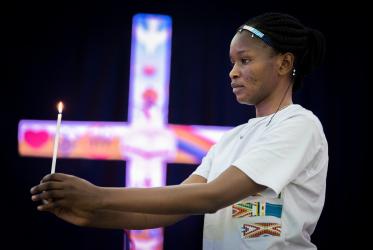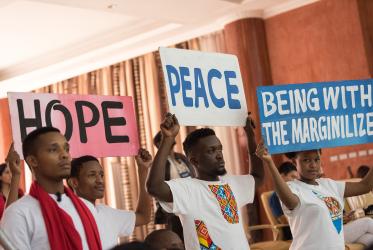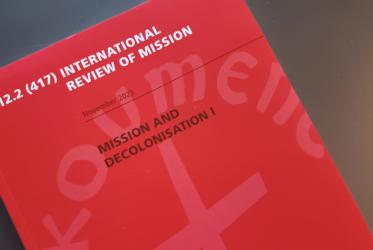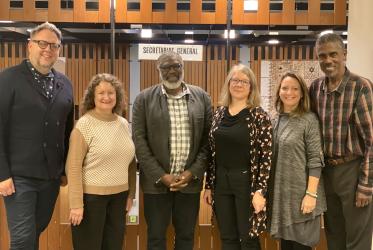By Marianne Ejdersten*
This year it is five hundred years since the Reformation. This has been commemorated throughout the year. A lot has happened in the world. The Reformation is ongoing in churches around the world. Discussions are constantly held about how a church should be today and how to reach out with the gospel. WCC News meets Bishop Helga Haugland Byfuglien this year, one of the most experienced and prominent women among Lutheran bishops in the world.
Bishop Helga is the leading bishop in Norway; in other countries this position is called archbishop. She has served as a bishop for 12 years, and as presiding (Preses) and leading bishop for six years. We meet in Oslo the day before the Nobel Peace Prize is awarded to ICAN (International Campaign to Abolish Nuclear Weapons) for its work to get rid of nuclear weapons. ICAN, which is a grassroots peace movement, is receiving the Peace Prize this year for its work. The city is full of peace lovers, peace activists and campaigners of all ages from all over the world. Bishop Helga will lead a religious service in the name of peace at 5 pm in the Holy Trinity Church in Oslo. The general secretary of the World Council of Churches, Rev. Dr Olav Fykse Tveit, is invited to preach on the topic of “Making peace is holy work”. We walk together from the Church Hall to the Trinity Church, excitedly chatting about the role of the Church of Norway in the country, and about the independence of the church from the state from 1 January this year. Bishop Helga mentions the importance of being a relevant church today and interpreting the signs of the times with a spiritual depth. We walk along the streets of Oslo. We meet plenty of people. They smile when they recognise Bishop Helga, wearing a bishop’s shirt and a purple shawl with a winter coat and high boots. Bishop Helga smiles at them and chats with some of them. It is like walking through the middle of the village with the local priest.
Mother a role model
Bishop Helga had a tough start to her life. She lost her father, who was a priest, at the age of just two. Her mother Olaug raised six children on her own, including twins born after her husband’s death. She moved to a flat with the children and took care of them and created a safe home. At the same time, she trained and graduated as a teacher. She was also active in the church council and took great responsibility in the parish. Her mother became a great role model for Bishop Helga, who is the fourth child in the family.
Bishop Helga came into contact with the KFUK-KFUM (Christian Association for Young Women and Christian Association for Young Men) in Norway at an early age. This provided a gateway to the church and to creating meaningful tasks for young people.
“I carry my mother’s love and her ability to create safety with me. She encouraged us to seek the right thing for us.”
Bishop Helga studied first in Bergen and then at the Theology Faculty in Oslo. Over time, the calling within her to become a priest grew. She was ordained in Nidaros by the then bishop in a provisional chapel in a former bomb shelter. She then worked as a priest in a suburb of Trondheim, with a focus on young people and families with children. Helga had in the meantime started a family and, with three young children, there was not much time for anything else for a few years. When the children had become a bit older, Helga trained as a family counsellor and had a column in the Vårt land (Our Country) magazine about relationships for 11 years. Relationships, young people and pastoral counselling are constant topics in Bishop Helga’s life.
“It is important to acknowledge young people and to give them the freedom and space to be a part of discussions and take responsibility.” Her time as a counsellor and columnist was important. Bishop Helga comments: “Pastoral counselling in the media requires special skills, you do not see the person but instead read and have to dare to give support, guidance and security.”
Bishop Helga tells stories about her time in the parish as “Important to be close to the parish, to live together and share life, in terms of prayers and activities.”
“My family history has helped shape me. I am Helga, and am quite down to earth. I am just an ordinary person, I am just being myself. I recognise the worth of simple things and am not a pompous person.”
Her humbleness is obvious throughout our conversation. Bishop Helga is still very much the warm, simple parish priest despite holding the highest office in the Church of Norway. She has stayed down to earth and retained simple ways.
Bishop Helga has been the leader of the Church of Norway during one of its greatest changes since the Reformation, with the separation from the state. Since 1 January, the Church of Norway has been an independent religious community.
In what way has this changed the church?
Bishop Helga: “It is the result of a long process. The changes are not particularly large or dramatic. But we are independent now and have to take complete responsibility for the church’s activities. We must continue to be relevant in people’s lives, preaching the gospel so that people can live in faith and trust in the gospel. We also have a particular responsibility to create the conditions for people of other religions to exercise their beliefs. We must be a modern church for the people. It requires courage and patience to pursue such a process of change. It takes time to put in place a new organisational structure. And it is important, among all these structural debates, to still be a church.”
Bishop Helga looks confidently to the future and the church’s role of being a church for everyone, with a clear focus on the gospel. “We should preach the gospel so that people feel that faith gives safety in life, trust in life.”
“The role of the church is to preach the equal value of all people, create a voice against injustice, motivate and give hope for change.”
Bishop Helga has been appointed to numerous leading positions, such as leader of the KFUK-KFUM, Bishop of Borg, and also Preses. For the last seven years she has also been vice president of the LWF (Lutheran World Federation).
“I have rarely sought leading positions. They have come to me, like a calling. It has been difficult to say no, there has been a good reason for taking on these roles with great humbleness and openness, and with a listening attitude.”
Part of a worldwide church
“The assignment at the LWF has given me many new insights into life as a Christian in other parts of the world. What we take for granted here in Norway is impossible for others. I think about the visit to Pakistan this spring. Christians are persecuted there and do not have the same freedom as we have here. It is beneficial to meet others, to broaden one’s perspectives and to see that what we take for granted is by no means a given for others. I am very humble about the leadership of Church of Norway.”
Bishop Helga is of the opinion that the Church of Norway has a lot to give to those who have very little. The Church of Norway has a long tradition of carrying out such work in close cooperation with various NGOs. She mentions Norway's KFUK - KFUM, KN (Norwegian Church Aid) and the numerous missionary and diaconal organisations. The church also contributes to important international diaconal work via LWF, WCC and ACT Alliance. “The Christian faith means that we should think of our neighbours, and love and support them in various ways.”
Bishop Helga believes that international diaconal work means volunteers and young people getting involved in Norway and also working abroad with partners. She mentions the Peace Prize, which is to be awarded tomorrow, being given to ICAN, and states that efforts to achieve peace and nuclear disarmament have been an important part of her life since the 1980s. “It is unbelievable that in 2017 we still live under the threat of nuclear weapons. We all want peace. We have to work to achieve peace all over the world, without peace there is no life, no future.”
We are getting close to Christmas and we talk about the unrest in the world, about the Middle East, about North Korea, and about the USA. Bishop Helga believes that churches have a role to play in this regard, for example via the World Council of Churches, “giving and showing hope, showing that everything is possible, creating change, creating justice and peace. This is in the power of the gospel and the grace. The church must preach and act so that it is credible when we say there are ways of achieving peace and justice in the world. Both here at home and out in the world, in things both large and small. Together and trusting in God's help, we can make the world a better place for everyone,” concludes Bishop Helga and wishes a blessed Christmas period to all readers.
Helga Haugland Byfuglien, born 22 June 1950 in Bergen, is the leading bishop in Norway. She was appointed Bishop of Borg Diocese in the Church of Norway in 2005 and was made Preses (equivalent of Archbishop or leading bishop) of the Bishops’ Conference from 21 October 2010. On 25 March 2011, she was appointed, as the first bishop, to the new position of Permanent Preses of the Bishops’ Conference.
The Church of Norway has just over 3.7 million members, which equates to 71.5% of the population, and is the largest church in Norway. It has 11 dioceses and 12 bishops (six women and six men), and around1,200 parishes.
*Marianne Ejdersten, director of communication at the World Council of Churches







